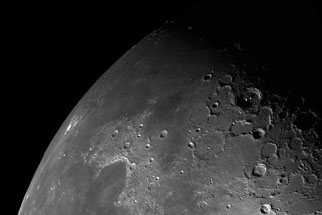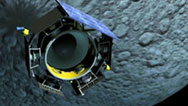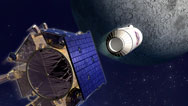Back to the Moon
- By David Levin
- Posted 04.01.09
- NOVA scienceNOW
If LCROSS were to find water on the moon, it may pave the way for our return there. But why would we want to go back? In this audio podcast, David Morrison, interim director of NASA's Lunar Science Institute, argues that we are a "multi-planet" species, and the moon could be a stepping-stone to the rest of the solar system, including Mars.
 Listen
Listen
Hear David Morrison of NASA's Lunar Science Institute explain why we need to return to the moon.
Transcript
Back to the Moon
Posted: April 1, 2009
DAVID LEVIN: You're listening to a NOVA podcast. I'm David Levin. In August 2009, a NASA probe called LCROSS will slam into the moon's surface. The impact will kick up a cloud of debris cloud researchers can analyze look for frozen water. If they find it, it'd be big news for NASA, and could even help shape their plan to return humans to the moon by 2018. But it does beg the question: if no one's been there since the early 1970s, why go back now? To find out, I spoke with David Morrison, the interim director of NASA's Lunar Science Institute.
DAVID LEVIN: I think there's a sense that we've been there, done that with the moon – that we've covered everything we can with the Apollo missions. So what more could we learn from going back?
DAVID MORRISON: Well, the fact is that we've had about 30 years without much activity on the moon and without many scientists involved, although some are still analyzing the Apollo Lunar samples. We now have a whole new generation of instruments that will allow us to study things in much greater detail. So we're asking a more sophisticated set of questions now about Lunar history, about the timing, the formation of the moon, about whether or not there was a heavy bombardment of asteroids early in the moon's history, that's still in question, about even the basic chemistry of the lunar crust which tells us something about its origin.
DAVID LEVIN: So, the LCROSS mission is trying to see if there is water in lunar craters—what would it mean if we did find it?
DAVID MORRISON: Well, in an operational sense, of course, finding water at the lunar poles might be the enabling discovery for cost-effective human missions and long-term existence on the moon—I mean, it'd be one of those spectacular discoveries if you really could confirm that it was there in sufficient quantity. Maybe LCROSS will, but it's going to be tough! I mean, I really hope they succeed. But then you have to ask, who's going to go down into those cold crater bottoms, how are you going to get energy, could you power a rover to go down there, what happens when you actually scrape the surface? It would be a wonderful discovery, but a heck of a challenge to know what to do next.
DAVID LEVIN: Assuming we do put humans back on the moon—how important would that be for staging missions that would go even farther in the future? Like Mars, maybe?
DAVID MORRISON: I think one of the reasons we want to have humans on the moon is as a test bed. To learn how to operate on the surface of another planet for extended periods of time, to learn what the effects are on the astronauts, because we want beyond that to go to the asteroids and to go to Mars. Mars is to me the primary long-term place to go in the solar system.
DAVID LEVIN: This does raise the question, though—if probes and if rovers have been so successful in the past at getting scientific information back to us, do we really even need a human presence there?
DAVID MORRISON: Yeah. That's a good question, and you get two entirely different classes of answers. They both say yes, but for different reasons. There are the thoughts that humans are ultimately destined to be a multi-planet species. And Mars is the only place we know of in the solar system where we can set up a self-sufficient outpost and live off the land. So if you truly believe that we are motivated to go beyond earth, to become multi-planet in our perspective, then we want to go to Mars. If, on the other hand, you're just asking, "what can humans add to our knowledge on Mars," then we come down always to the search for life. The environments on Mars that are most likely to support microbial life today are pretty far below the surface. We don't know if 100 meters, or a kilometer, or whatever. Very hard to access robotically. It may be that the presence of humans on the surface is an enabling factor for getting to those places and finding out, really, if mars is or was inhabited and if it still have a viable ecosystem deep below the surface.
DAVID LEVIN: Getting to Mars seems pretty far off in the future, but what would you like to see happen on the Moon in the next few years?
MORRISON: I think the thing that's going to happen in the very near future is the international networks. And that will be terrific from an international collaboration point of view as well as the science. If we have multiple landers on the moon, and connect them via communications satellites, let them talk to each other, and compare the conditions in different places including the far side, I think that's going to be scientifically very interesting, and that can be done with relatively low-cost missions. Which are of interest to the European Space Agency, to the British, the Chinese, Japanese, Indians, Russians—the countries that are now orbiting the moon all want to go in and land with small scientific landers as the next step. And that could be happening in the next five or six years.
Credits
Audio
- Produced by
- David Levin
Images
- (the moon)
- © NASA/JPL-Caltech
Related Links
-

First Man on the Moon
He risked his life for the nation and became a world icon, but who was Neil Armstrong?
-

Moon Smasher: Expert Q&A
NASA's Dan Andrews answers questions about LCROSS and how it might pave the way for future space exploration.
-

Going Lunar for Less
In this video extra, see how LCROSS, with ingenuity and spare parts, is exploring a big question on a small budget.
-

Moon Smasher
A NASA satellite called LCROSS heads to the moon in hope of finding buried water.
You need the Flash Player plug-in to view this content.



